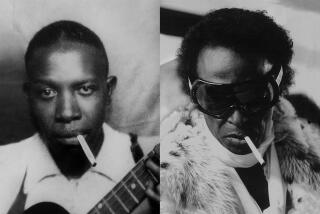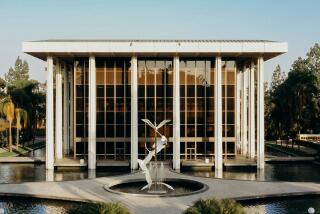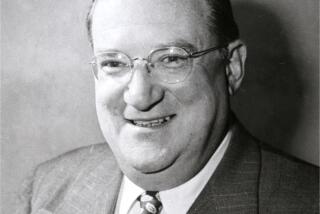Historic Radio Memorabilia to Be Given to Library
Thousands of scripts, recordings and other memorabilia from the Golden Age of Radio--now stored in a cement basement in Hollywood--will be added to the extensive display at the Thousand Oaks Library, creating one of the most expansive collections in the world.
“The American Radio Archives is an awesome amenity to have in our own backyard,” said Scott Mitnick, deputy city manager. “Our collection already brings people from all over the world.”
He said the Thousand Oaks Library Foundation, which administers the library’s present collection, will seek funding for a new building to display both.
The deal was announced Tuesday by the foundation and Pacific Pioneer Broadcasters, a 700-member historical group that owns the items stored in the basement of a Washington Mutual Bank building in Hollywood.
The collection ranges from recordings of radio stars--such as Frank Sinatra, Bob Hope, Joseph Cotten, Jack Benny, Beatrice Kay and Edgar Bergen--to Bing Crosby’s original microphone to models of radios built throughout the 20th century.
There are also posters, statuettes, awards, props and sound-effects equipment--chains, chimes, bells, a car door, a front door and a contraption that sounds like a military unit marching.
The library’s current collection, amassed over 18 years, includes more than 23,000 radio and TV scripts and 5,000 hours of recordings. Featured personalities include Norman Corwin, Carlton E. Morse and Rudy Vallee, whose archives were acquired in 1987 when the foundation outbid the Smithsonian Institute.
Architect Gary Heathcote said the foundation hopes to build a 15,000-square-foot building next to the library to house the American Radio Archives.
But that is in the future, library director Stephen Brogden said.
“For the moment, [the broadcasters’ collection] will stay where it is,” he said. “It will take a minimum of five years to catalog and process the extremely valuable collection.”
About 100 people were on hand Tuesday for the announcement.
“This will be a great marriage,” said Jack McQueen, Pacific Pioneer Broadcasters president. “It will create the largest collection for radio in the country.
“The Thousand Oaks Library is something special--a prototype for libraries of the future with a great commitment to radio.”
Right now, the broadcasters’ items are stored out of sight of everyone except the group’s members, all of whom must have worked at least 20 years in the broadcasting industry in order to belong.
The collection contains more than 20,000 historically significant transcriptions and 6,000 tapes from the Armed Forces Radio Library, KFI Library, World War II Broadcasters and rare radio broadcasts. Each 33 1/3 RPM, 16-inch disc has 15 minutes of sound recorded on each side.
Currently, the discs are in boxes lining walls on hand-built wooden shelves. Words describing each recording have been carefully marked with black felt tip pen. “Gunsmoke, 11-25-56,” one said.
There are also rows of file cabinets with scripts and more metal or glass records neatly filed. There is a room full of old microphones, and walls covered with photos and posters. Old radios and equipment hang from the ceiling or are stacked on the floor.
Child actress and radio star Margaret O’Brien, who played Beth in “Little Women” and won an Oscar for her portrayal of Judy Garland’s little sister in “Meet Me in St. Louis,” was one of those at the announcement.
O’Brien, a Thousand Oaks resident, was the first to donate to the newly combined group, presenting her personal collection of radio memorabilia. Announcer Gary Owens from TV’s “Laugh-In” was also there, as was Les Tremayne, a Radio Hall of Fame recipient.
A statement was read by Candice Bergen--who said she grew up being known as dummy Charlie McCarthy’s sister--expressing gratitude that the work of her father, Edgar Bergen, would be cared for so that future historians and scholars could study it.
The collection is aimed at both scholars and the public, participants said.
“We’ve been working on this for 18 years,” said Antoinette Hagopian, library foundation president. “We’re going to re-create the dazzling moments of the golden era of radio. It means we will have one of the most extensive radio broadcasting history centers in the country--a center for research, study and enjoyment not only for our county but for the world.”


